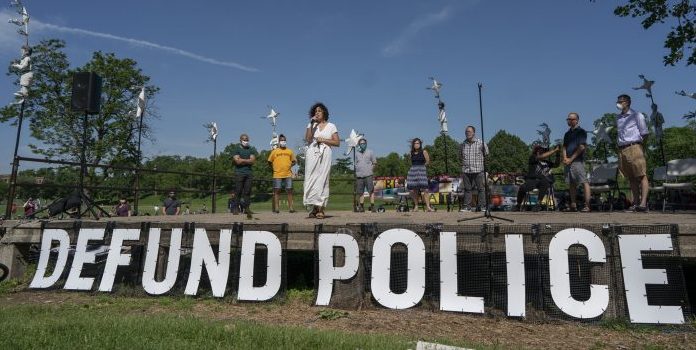The harsh and accusatory anti-police rhetoric used by Minneapolis‘s Democrat city officials during last summer’s race-riots will wind up costing the city at least an extra $6.4 million.
The city—where riots first broke out following the Memorial Day death of George Floyd—later led the nation’s left-run urban centers in advancing efforts to “defund the police.”
Some, fearing political backlash in the Nov. 3 election, attempted afterward to downplay or dial back their stated intentions.
However, Minneapolis was among those that passed a spate of stringent measures limiting the ability of law-enforcement to do its job effectively.
The city’s violent-crime rate skyrocketed as a result.
Along the way, hundreds of police officers jumped ship, leaving a force that was reduced by more than 25%, down to only 638 police officers, the Minneapolis Star Tribune reported.
Although it began the current year with 817 officers—already running a significant deficit from past years—155 of those remain on extended medical leave, with many of them citing post-traumatic stress disorder in the wake of the riots.
Yet, the extra funding that the Minneapolis City Council is now obligated to spend on recruiting and training new officers will yield only a small drop in the bucket to help stem its losses.
In total, it expects to have 36 more officers trained by the end of the year and another 28 working through the hiring process, the Star Tribune reported.
While residents have applied pressure on the city—citing delayed response times and other concerns, particularly in the disproportionately black urban communities most affected by the loss of police presence—not all of the leftist lawmakers have abandoned their earlier position.
Some councilors have continued to raise questions about officer “discipline.”
Moreover, officials including Mayor Jacob Frey and Police Chief Medaria Arradondo announced extra steps in the hiring process that will likely lead to further delays.
Those include new screening questions about whether the would-be officers had lived in Minneapolis, whether they had degrees in fields related to law-enforcement, and whether they were involved in outside community-service programs like the Police Activities League.
MPD officials said they hope the changes “will help us to really feel confident that we are recruiting the kinds of candidates we want right from the beginning,” Deputy Police Chief Amelia Huffman told the Star Tribune.
In addition to approving the extra funding for expanding its police force, the city also earmarked $230,000 to contract Chicago-based risk-management firm Hillard Heintze for a comprehensive analysis of its response to the George Floyd riots.
Meanwhile, the trial for Derek Chauvin, the former MPD officer responsible for Floyd’s death, is set to begin next month.
The verdict—should Chauvin be found not guilty—is sure to trigger a new round of nationwide riots that could prove an early test for the newly-installed Joe Biden administration.
Biden’s predecessor, former president Donald Trump, largely left the response to the discretion of state and local officials to determine whether support was needed from National Guard troops.
Biden, on the other hand, may well follow the footsteps of his ex-boss, former president Barack Obama, who was quick to dispatch militarized “peace-keeping” forces.
Obama even dispatched his then-attorney general, Eric Holder, to directly oversee and intervene in the process during Ferguson, Missouri-based riots surrounding the shooting of Michael Brown.
Holder’s aggressive overreach and botched handling of the case may ultimately have contributed to his decision to step down shortly thereafter.

